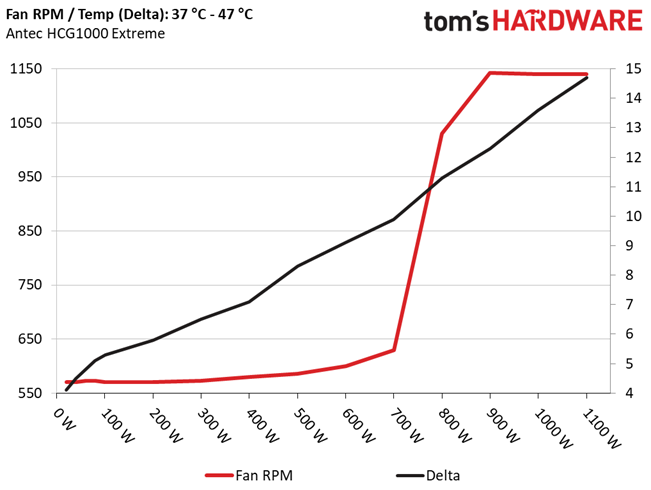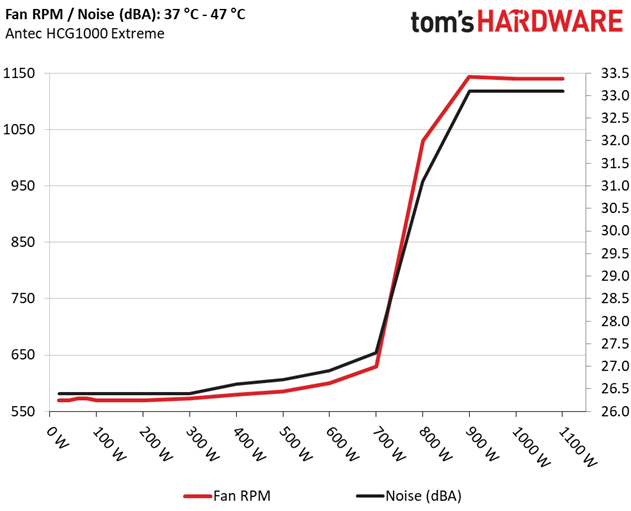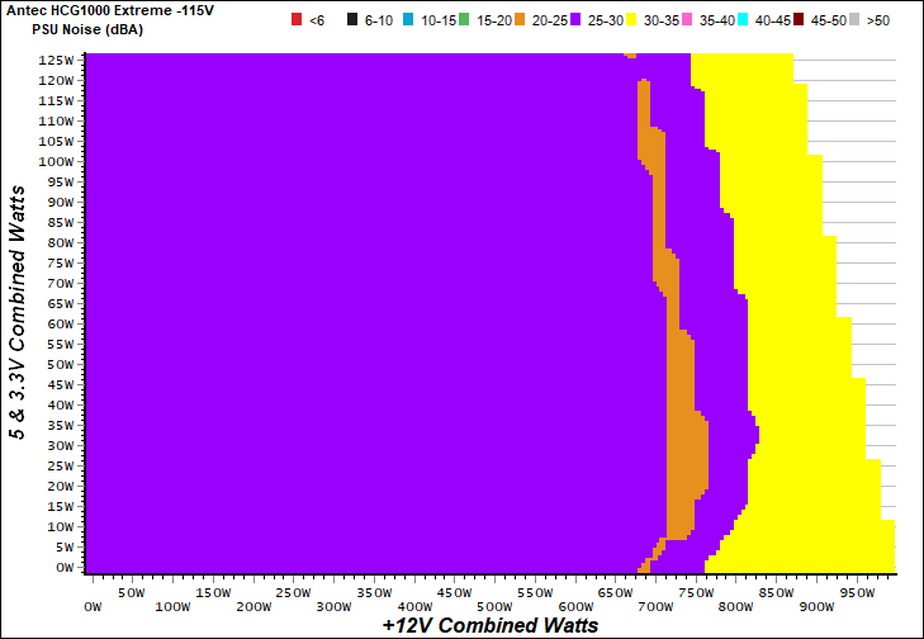Antec HCG1000 Extreme 1000W PSU Review: Good Looks For $150
Why you can trust Tom's Hardware
Efficiency, Temperature & Noise
Efficiency
Our efficiency testing procedure is detailed here.
Using results from the previous page, we plotted a chart showing the HCG1000 Extreme’s efficiency at low loads, and loads from 10 to 110 percent of its maximum-rated capacity.
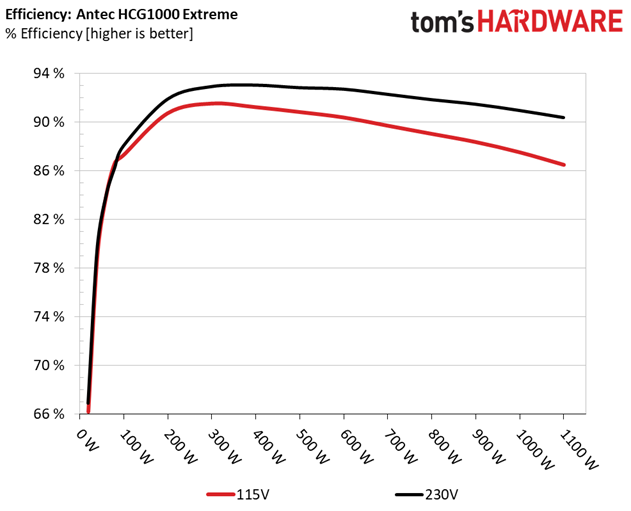
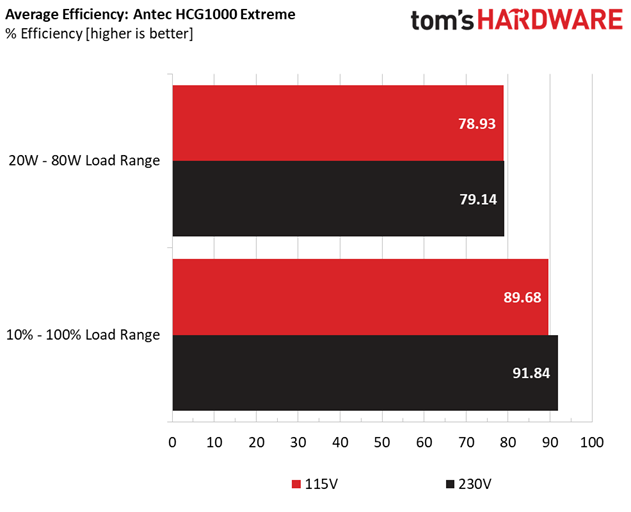
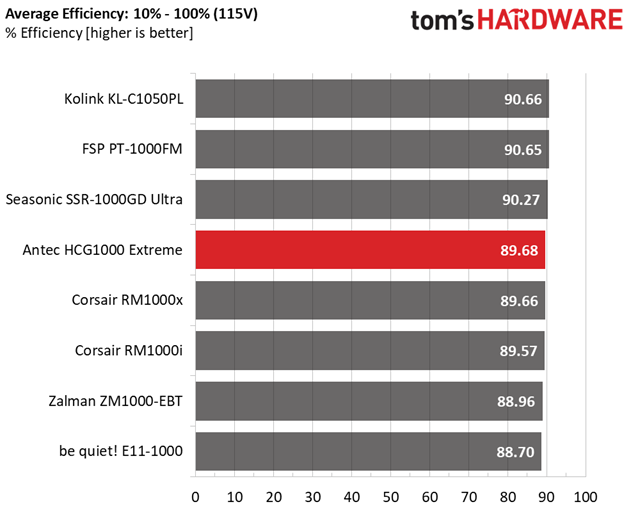
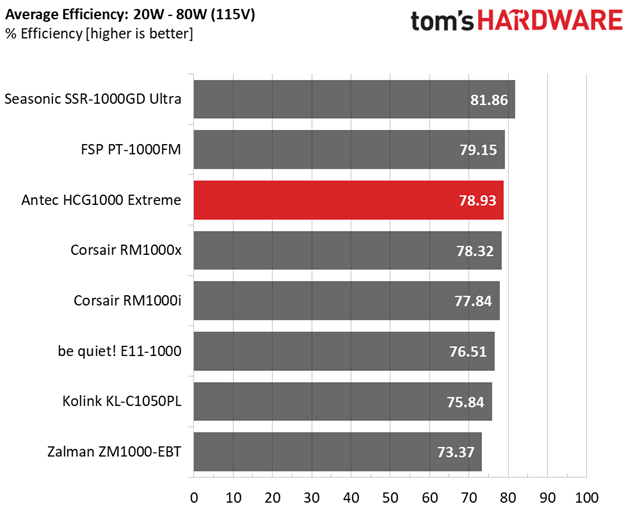
The PSU fares well under light and moderate loads.
Efficiency At Low Loads
In the following tests, we measure the HCG1000 Extreme's efficiency at loads significantly lower than 10 percent of its maximum capacity (the lowest load the 80 PLUS standard measures). The loads we dial are 20, 40, 60, and 80W. This is important for representing when a PC is idle, with power-saving features turned on.
| Test # | 12V | 5V | 3.3V | 5VSB | DC/AC (Watts) | Efficiency | Fan Speed | PSU Noise | PF/AC Volts |
|---|---|---|---|---|---|---|---|---|---|
| 1 | 1.211A | 0.501A | 0.484A | 0.196A | 19.758 | 66.175% | 570 RPM | 26.4 dB(A) | 0.661 |
| 12.082V | 5.016V | 3.327V | 5.120V | 29.857 | 115.34V | ||||
| 2 | 2.472A | 0.999A | 0.995A | 0.391A | 40.196 | 79.025% | 570 RPM | 26.4 dB(A) | 0.835 |
| 12.087V | 5.014V | 3.325V | 5.114V | 50.865 | 115.31V | ||||
| 3 | 3.663A | 1.498A | 1.474A | 5.108A | 59.693 | 83.840% | 573 RPM | 26.4 dB(A) | 0.906 |
| 12.088V | 5.014V | 3.325V | 5.108V | 71.199 | 115.28V | ||||
| 4 | 4.920A | 1.996A | 1.988A | 0.784A | 80.096 | 86.664% | 573 RPM | 26.4 dB(A) | 0.945 |
| 12.089V | 5.014V | 3.325V | 5.103V | 92.421 | 115.26V |
In two of four tests, Antec's HCG1000 Extreme exceeded the 80% efficiency mark. Its fan spun slowly, even though we had the semi-passive feature enabled. At least on our sample, this capability only worked at very low operating temperatures. We weren't bothered, though. It's more important to us that heat is removed quietly under light loads.
5VSB Efficiency
The ATX specification (revision 1.4), along with CEC, ErP Lot 3 2014 and ErP Lot 6 2010/2013, states that 5VSB standby supply efficiency should be as high as possible, recommending 75 percent or higher with 550mA, 1A, and 1.5A of load. The PSU should also achieve higher than 75% efficiency at 5VSB under full load, or with 3A if its max current output on this rail is higher than 3A.
We take six measurements: one each at 100, 250, 550, 1000, and 1500mA, and one with the full load the 5VSB rail can handle.
Get Tom's Hardware's best news and in-depth reviews, straight to your inbox.
| Test # | 5VSB | DC/AC (Watts) | Efficiency | PF/AC Volts |
|---|---|---|---|---|
| 1 | 0.100A | 0.513 | 73.601% | 0.068 |
| 5.125V | 0.697 | 115.36V | ||
| 2 | 0.250A | 1.281 | 76.845% | 0.152 |
| 5.122V | 1.667 | 115.36V | ||
| 3 | 0.550A | 2.815 | 77.805% | 0.269 |
| 5.115V | 3.618 | 115.36V | ||
| 4 | 1.000A | 5.107 | 78.136% | 0.359 |
| 5.106V | 6.536 | 115.36V | ||
| 5 | 1.501A | 7.644 | 78.352% | 0.409 |
| 5.094V | 9.756 | 115.35V | ||
| 6 | 3.001A | 15.171 | 76.148% | 0.471 |
| 5.056V | 19.923 | 115.34V |
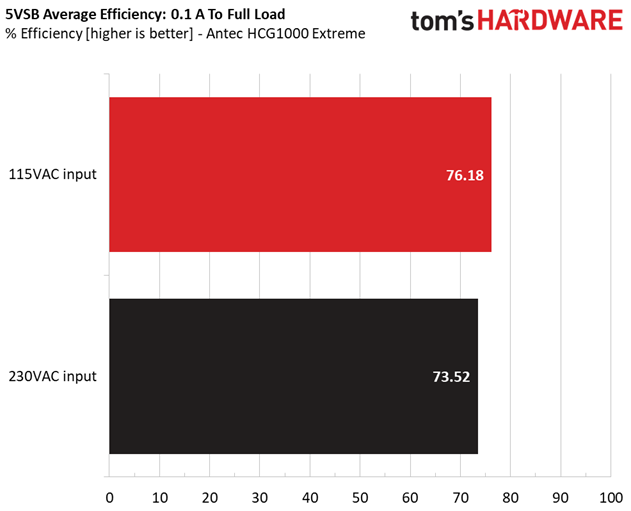
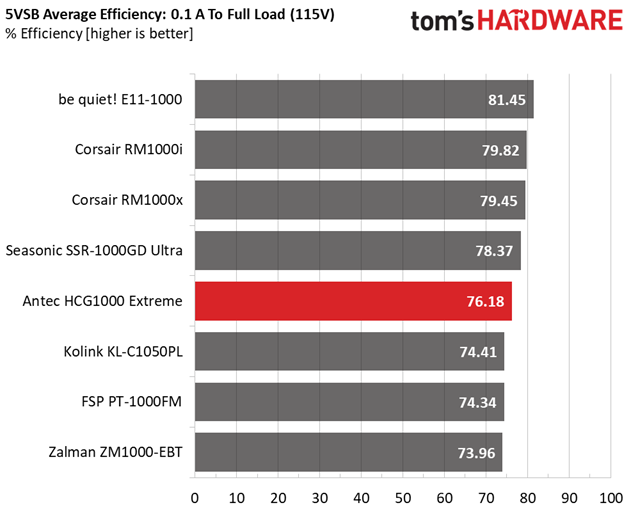
The 5VSB rail isn't as efficient as we'd like from a high-end power supply. Seasonic's Focus platform needs an updated 5VSB regulator able to facilitate higher efficiency levels.
Power Consumption In Idle And Standby
In the table below, you'll find the power consumption and voltage values of all rails (except -12V) when the PSU is idle (powered on, but without any load on its rails), and the power consumption when the PSU is in standby mode (without any load, at 5VSB).
| Mode | 12V | 5V | 3.3V | 5VSB | Watts | PF/AC Volts |
|---|---|---|---|---|---|---|
| Idle | 12.127V | 5.019V | 3.329V | 5.125V | 7.918 | 0.446 |
| 115.4V | ||||||
| Standby | 0.047 | 0.005 | ||||
| 115.4V |
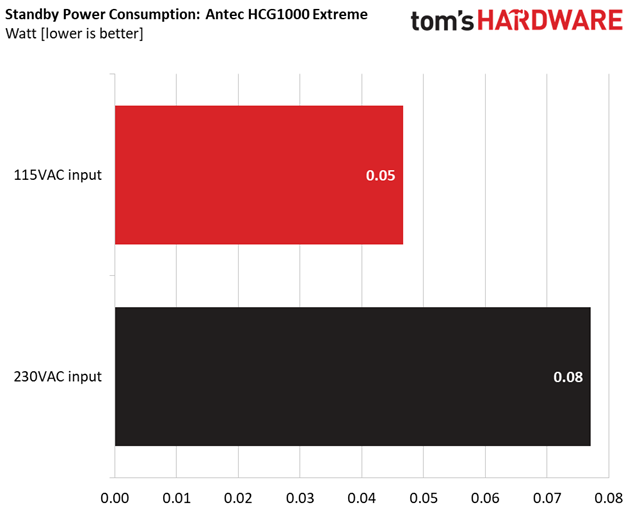
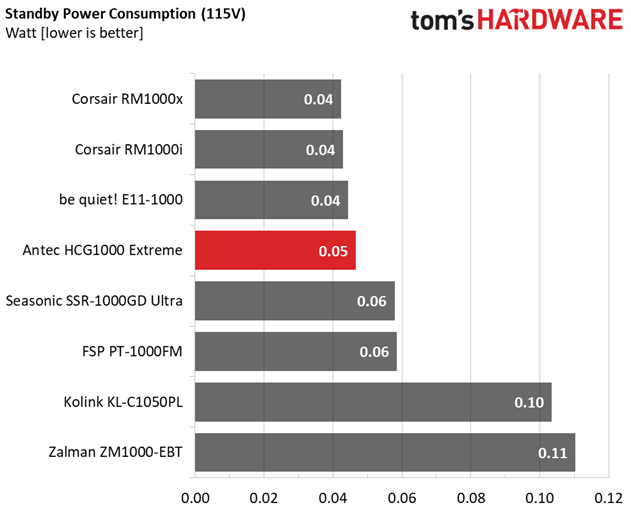
Measured vampire power was very low with both voltage inputs.
Fan RPM, Delta Temperature, And Output Noise
Our mixed noise testing is described in detail here.
The first chart below illustrates the cooling fan's speed (in RPM), and the delta between input and output temperature. The results were obtained at 37°C (98.6°F) to 47°C (116.6°F) ambient temperature.
The next chart shows the cooling fan's speed (again, in RPM) and output noise. We measure acoustics from one meter away, inside a hemi-anechoic chamber. Background noise inside the chamber is below 6 dB(A) during testing (it's actually much lower, but our sound meter’s microphone hits its floor), and the results are obtained with the PSU operating at 37°C (98.6°F) to 47°C (116.6°F) ambient temperature.
The following graph illustrates the fan's output noise over the PSU's operating range. The same conditions of the above graph apply to our measurements, though the ambient temperature is between 30°C (86°F) to 32°C (89.6°F).
Antec's HCG1000 Extreme features a conservative fan profile that keeps the cooling fan at low speeds. For reasons unknown to us, the semi-passive mode wasn't active on our sample, even after specifically enabling it for this test.
MORE: Best Power SuppliesMORE: How We Test Power SuppliesMORE: All Power Supply Content
Current page: Efficiency, Temperature & Noise
Prev Page Load Regulation, Hold-Up Time & Inrush Current Next Page Protection Features & DC Power Sequencing
Aris Mpitziopoulos is a contributing editor at Tom's Hardware, covering PSUs.
-
richardvday I am very curious why so many 1000W or larger PSU's ? How many of these do they actually sell ? How many people need a 1000w PSU ? 500-600W seems the sweet spot that most people would need. I have an 850W that I have been kicking myself in the head for ever since really. I need 500W so my efficiency sucks, wasting energy.Reply -
totalinsanity4 PSUs are actually most efficient when you're at about half load, so people with 500-600W loads will actually be seeing a slightly lower power bill with a 1000W PSU than, for instance, a 650W oneReply -
crmaris modern PSUs featuring LLC resonant converters also have good efficiency under light loads regardless capacity, given that their design is good. With LLC Burst Mode efficiency under light loads vastly improves.Reply
